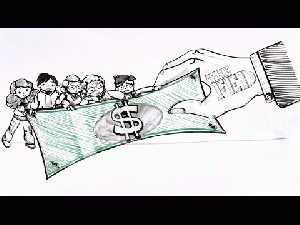Reprinted from Smirking Chimp
The minutes from the most recent Federal Reserve Board Open Market Committee (FOMC) meeting indicate that many of its members are anxious to move forward with more interest rate hikes. The next hit could come as soon as June. This should have the country very worried.
Just for some basic orientation, the point of raising interest rates is to slow the economy and keep it from creating too many jobs. The members of the FOMC are worried that the labor market is becoming too tight, with the unemployment rate falling too low. This would give workers more bargaining power, allowing them to get larger wage gains, which could be passed on in higher prices, kicking off an inflationary spiral. If that doesn't sound like the economy you see, then it's probably because you have a better idea of the data than the folks at the FOMC.
Starting at the basics, by many measures the labor market is still far from recovering to its pre-recession level, in spite of a recovery that will soon be entering its 8th year. Most notably the employment to population ratio (EPOP), which is the percentage of adults with jobs, is still more than 3.0 percentage points below its pre-recession level.
The proponents of interest rate hikes dismiss this statistic, arguing that the drop in EPOPs is due to baby boomers retiring. But retiring baby boomers can't explain a drop in the EPOP of more than 2.0 percentage points among prime age (25-54 years old) workers.
This drop is roughly the same for men and women. That point is important. There had been a very slight downward trend in the EPOP rate for prime age men in dating back to the sixties, but the EPOP for women had been rising.
With the recession we get a sharp acceleration of the downward trend for men and a reversal of a prior upward trend for women. We can either believe that some unknown factor suddenly made millions of prime age men and women less interested in working, or we can believe that a weak labor market led many to give up looking for work. The rate hikers apparently believe in the unknown.
There is much other evidence that is consistent with the weak labor market view. For example, the percentage of workers involuntarily working part-time jobs is extraordinarily high for a period with a 5.0 percent unemployment rate. The median and average duration of unemployment spells is also much higher than we would expect with a 5.0 percent unemployment rate. And, the percentage of workers who are confident enough in the labor market to quit their job without a new one lined up is extraordinarily low.
These measures point to a labor market that is far too weak to support the excessive wage increases that the FOMC's fears, but we can jump ahead to look directly at the wage data. There has been a very modest acceleration in the average hourly wage, which was rising at an annual rate of just over 2.0 percent two years ago has risen by 2.5 percent over the last year.
But it is not clear that even this very modest acceleration suggests labor market strength. There has been a shifting in labor compensation in recent years from benefits, mostly health care insurance, to wages. As a result, hourly compensation has been increasing less rapidly than wages. The Bureau of Labor Statistics' Employment Cost Index, which includes both wages and benefits, increased by just 1.9 over the last year. That is down slightly from an increase of just over 2.0 percent in the prior year. In short, there is no plausible story of labor costs accelerating, just a shift in the composition of compensation.
Even if there were a modest acceleration in wage growth, that would not be a reason to slam on the brakes. The weak labor market in the recession years led to a sharp redistribution from workers to corporations, with the labor share of income in the corporate sector dropping by 3.6 percentage points. This amounts to a loss of more than $1,500 per year for a typical worker.
If the Fed deliberately weakens the labor market at the first hint of wage acceleration, it will be locking in place this redistribution from workers to corporations. This is money going from ordinary workers to those who own large amounts of stock, as well as CEOs and other top executives.
The story is even worse since we know the people who get hit hardest by high unemployment are those at the bottom of the income ladder. Less educated workers, as well as African Americans and Hispanics, feel the effect of a weak labor market the most.
As a rule of thumb, the unemployment rate for African Americans is twice the white unemployment rate. For African American teens it is six times the white unemployment rate. This is a good argument for allowing the unemployment rate to get as low as possible. The low unemployment years of the late 1990s were the only time in the last four decades where those at the middle and the bottom of the income distribution saw sustained gains in income.
On the flip side, it is difficult to see the urgency of raising rates. There is exactly zero precedent for inflation taking off in some out of control spiral. Even in the 1970s, the rise in inflation was a very gradual process. And everyone agrees the economy is far more flexible today, and therefore less inflation-prone.
So let's get the Fed's finger off the trigger. Let wages rise, not interest rates.






